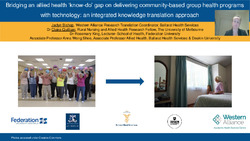Please use this identifier to cite or link to this item:
http://hdl.handle.net/11054/1812| Title: | Bridging an allied health ‘know-do’ gap on delivering community-based group health programs with technology – an integrated knowledge translation approach. |
| Author: | Bishop, Jaclyn L. Quilliam, C. King, R. Wong Shee, Anna |
| Issue Date: | 2021 |
| Conference Name: | 14th National Allied Health Conference (NAHC) |
| Conference Date: | August 9-12 |
| Conference Place: | Online |
| Abstract: | Background: The risk of COVID-19 transmission from face-to-face activities means alternative ways to deliver community-based group health programs (‘group programs’) are needed. Allied health practitioners at two regional health services (knowledge-partners) and local researchers adopted an Integrated Knowledge Translation (iKT) approach to review the evidence on delivering group programs with technology. This study captured knowledge-partner and researcher experiences of iKT. Method: A survey designed to explore the components of iKT was distributed to all knowledge-partners who participated in at least one iKT activity (n=25). Semi-structured interview invitations were extended to the same knowledge-partners and participating researchers (n=5). These interviews explored in depth the partnering process and perceived impact of iKT. The interviews were recorded, transcribed verbatim and analysed thematically. Findings: Six surveys and ten interviews were completed. Knowledge-partners and researchers viewed the iKT experience positively, with a strong shared urgency and purpose in answering a time-sensitive, practice relevant question. The language used by both knowledge-partners and researchers suggested that iKT was challenging to implement, due to knowledge-partner clinical workload and urgency of the research question. This resulted in a more consultative than integrated process, with greater perceived involvement by knowledge-partners in the earlier stages of iKT (shaping the research question, data collection) compared to later stages (interpreting the study findings/crafting messaging). Conclusion: Achieving fully integrated knowledge translation was challenging given the time-sensitive nature of the allied health evidence-practice gap, however the process was highly valued and beneficial for both knowledge-partners and researchers. |
| URI: | http://hdl.handle.net/11054/1812 |
| Internal ID Number: | 01749 |
| Health Subject: | ALLIED HEALTH HEALTH PROGRAMS TELEHEALTH ONLINE COMMUNITY BASED |
| Type: | Conference Presentation |
| Appears in Collections: | Research Output |
Files in This Item:
| File | Description | Size | Format | |
|---|---|---|---|---|
| Jaclyn_Bishop_Claire_Quilliam_3_6.pdf | 555.97 kB | Adobe PDF |  View/Open |
Items in DSpace are protected by copyright, with all rights reserved, unless otherwise indicated.
